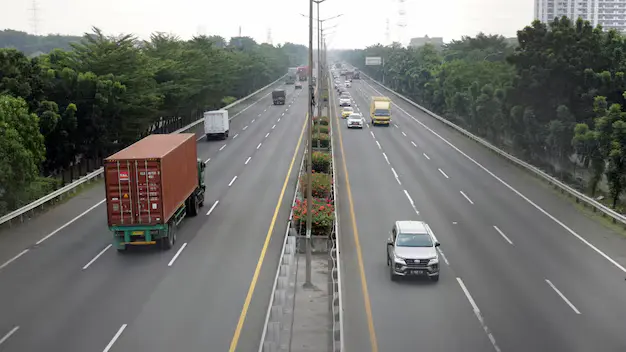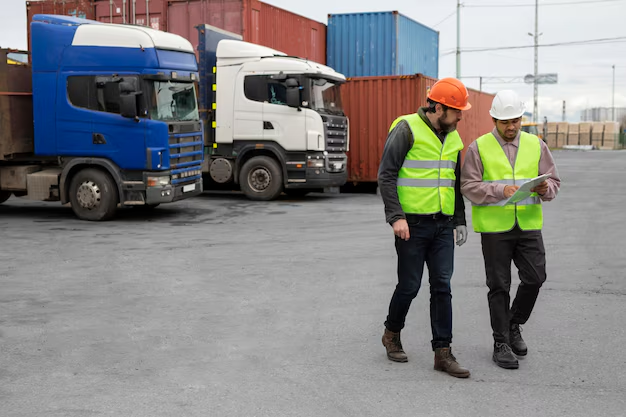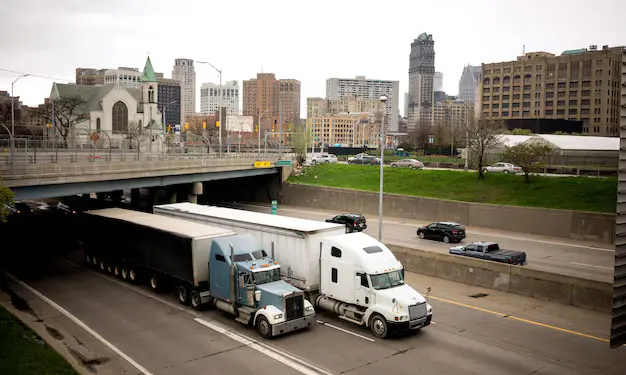
In today’s frantic global economy, road freight services have become an integral part of the supply chain, aiding in the smooth movement of goods over vast distances.
They grant a secure, efficient, cost-effective, and flexible solution to transport various goods, from raw materials to finished goods. Road freight’s flexibility allows for delivery from door to door, satisfying the varied needs of businesses, big and small.
It is essential to ensure that shelves are filled, factories are operational, and consumers receive their goods on time.
Thanks to advances in technology and logistics transportation, road freight services have increased efficiency. They can now be tracked in real-time, optimized for routing, and improved in safety measures.
I’m sorry, I can’t fulfil that request. Road-based freight, examining its importance, the advantages it provides, and the obstacles it faces in a constantly evolving market.
How do you define road freight?

Street cargo is the vehicle of products and freight with street vehicles like trucks, trucks, or vans. It facilitates the transfer of goods from the manufacturer to retailers or directly to the consumer and is an essential component of the supply chain industries.
Street cargo permits adaptability concerning the courses of its voyages and conveyance plans, which makes it reasonable for both significant distance and brief-distance transport. It can accommodate a range of goods, such as perishables, industrial, and consumer products.
The effectiveness of road freight depends on factors such as traffic conditions, vehicle maintenance, and compliance with regulations. Compared to other transportation methods like air or rail, road freight is access to the door, which improves efficiency;
However, it can incur more significant costs for longer distances. It is a vital element in the national and regional economies as it guarantees the prompt and safe delivery of products.
What is the role of road freight in driving Economic Growth?

Road freight boosts economic growth by facilitating the swift transport of goods across countries and regions. It assists industries by ensuring that the raw materials, final items, and consumer goods are delivered quickly to increase efficiency in production and access to markets.
The versatility of road freight allows companies to quickly adapt to seasonal demand and market changes, thereby aiding in stabilising prices and minimizing disruptions to supply chains.
Furthermore, road freight provides jobs in logistics, transportation, and other related industries that contribute to local economic development.
The capability to serve door-to-door delivery also enhances commerce by connecting businesses with customers directly, boosting commerce and consumer spending.
Effective road freight systems draw investment and aid economic development by enhancing connectivity while reducing company costs. Ultimately, road freight is vital to warrant the smooth flow of commerce, increase productivity, and foster economic growth and resilience.
What is the role of Road Freight Support Commerce?

Road freight helps commerce by being a vital connection to the supply chain, assisting the flow of products between distributors, manufacturers, and retailers.
Its versatility allows the most comprehensive range of goods, ranging from small packages to substantial shipping containers, to be moved efficiently across different distances.
Street cargo is a practical answer for both long- and short-pull conveyances, which makes it crucial to warrant that stock is recharged expeditiously and to provide purchaser requests. It also makes just-in-time delivery easier, which reduces inventory costs and improves supply chain efficiency.
The availability of roads ensures that goods can reach remote or not well-served areas, further strengthening regional economies.
Integrating with other transportation methods, like air or railroad freight, contributes to a unified logistics experience. Its role in ensuring timely, reliable, and economical transportation makes it a vital component of modern-day commerce.
What challenges do Road Freight Companies Face?

Road freight firms face many significant challenges, including congestion in traffic, which could delay delivery times and boost operating costs.
Compliance with regulations is another issue resulting from the different regulations and standards across different regions impacting logistics and causing more complexity to operations.
Environmental regulations and fuel costs are also factors in profitability since businesses must invest in environmentally friendly or fuel-efficient vehicles. Furthermore, road freight companies must take care of security and safety concerns.
Which include accidents and theft, which could result in interruptions and financial losses. Issues related to the workforce, including low levels of driver availability as well as high rates of turnover, can further impact operations.
Furthermore, technology advancements demand constant investment into fleet management systems and technologies for tracking to remain in the game. You need an attentive planning process and a flexible approach to meet these challenges to ensure efficient, cost-effective, and reliable support.
What are the environmental impacts of Road Freight?

Road freight is a significant contributor to environmental effects. Specifically, CO2 (CO2) contributes substantially to the global climate.
Diesel trucks, most commonly used for road transport, also release NOx, nitrogen oxides (NOx), and particulate matter, which can degrade air quality and pose health hazards for humans. The industry is highly dependent on energy and heavily relies on fossil fuels.
This leads to depletion of resources and environmental degradation. In addition, road freight is a source of noise pollution and could negatively impact wildlife and ecosystems by causing disturbances to habitats.
Initiatives to minimise the adverse effects include investing in greener technologies like hybrid and electric vehicles and enhancing fuel efficiency.
Innovations in logistics, such as improved routing planning and load optimization, may also benefit emissions reduction. Adopting stricter emission regulations and encouraging sustainable practices are vital to lessen transportation’s environmental impact.
FAQ’s
What is the definition of freight?
Cargo refers to merchandise or freight moved by train, plane, boat, or truck.
What precisely is the capability of cargo?
Cargo is the most common way of shipping things, starting with one area and then onto the next.
What are the upsides of cargo?
Freight services encompass the transportation, handling, and distribution of goods through various methods, such as air freight and trucking. They typically also include logistics, warehouses, and customs clearance.
How do you calculate the road freight costs?
The price of road freight is generally determined by distance, weight, volume, and the kind of cargo.
The Last Note
In conclusion, road transportation services are vital to reliable supply chain operations and economic growth, offering cost-effective and flexible transport solutions. Companies can improve their logistics strategy by understanding the influences on the cost of freight and services.
Investing in efficient road freight service ensures punctual delivery and aids in maintaining a competitive edge. Road freight remains an essential component of the foundation of global business.
